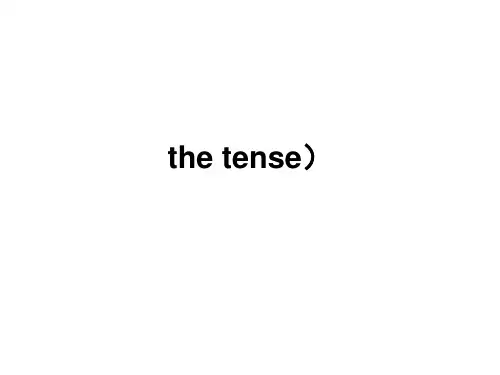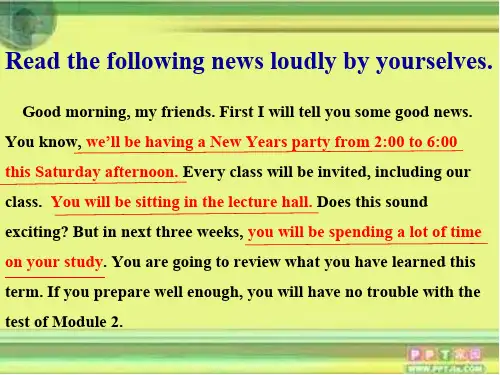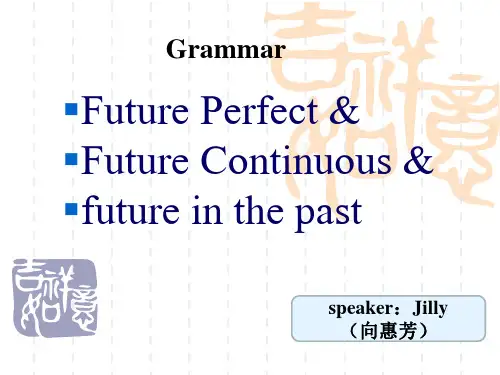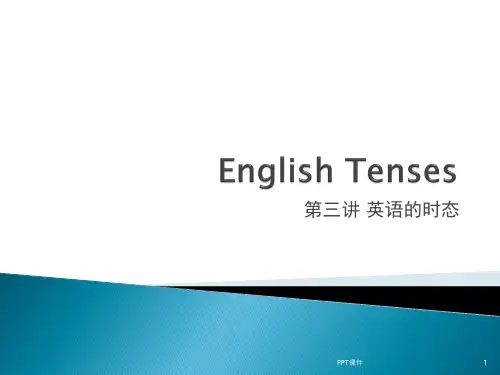将来进行时将来完成时将来完成进行时方案课件
合集下载
完成时态的用法 ppt课件

• 3、将来完成时所表示的动作要发生在将来某一具体 时间(含该时间)之前;
• 因此,与完成时态连用的时间状语只能是一些可以限 制时间范畴的词语。而不是具体时间。句中的时间状 语,谓语的时态,从句的时态,或者是上下文等,都 可以用来作为判断时间的截止点的依据。
现在完成时例句:
• I have been to Beijing many times. • 我多次去过北京。(无时间状语,强调对现在的影响) • We have had four tests so far this semester. • 这学期,我们到现在为止已经考过四次了。(现在之前
the tense)
• 一般现在时 • 一般过去时 • 一般将来时 • 过去将来时 • 现在进行时 • 过去进行时 • 将来进行时 • 完成时:现在完成时;过去完成时;现
在完成进行时;将来完成时
精品资料
• 你怎么称呼老师?
• 如果老师最后没有总结一节课的重点的难点,你 是否会认为老师的教学方法需要改进?
• 到下星期天,我住院两个月。 (计算 的截止时间)
• Lorna hasn’t given the teacher her test paper yet, but she will have given the teacher her test paper by the end of the period.
• 现在完成进行时强调动作或状态开始于过去,一 直持续到现在,或在现在以前已结束,或延续到 将来。如果没有指明时间,则可表最近的一直持 续的行为。
• 在不用时间状语的情况下,现在完成进行时表示 动作仍在进行,而现在完成时则表示动作在过去 已经结束。
• Be careful! John has been painting the door.小心 点!约翰在漆门。
• 因此,与完成时态连用的时间状语只能是一些可以限 制时间范畴的词语。而不是具体时间。句中的时间状 语,谓语的时态,从句的时态,或者是上下文等,都 可以用来作为判断时间的截止点的依据。
现在完成时例句:
• I have been to Beijing many times. • 我多次去过北京。(无时间状语,强调对现在的影响) • We have had four tests so far this semester. • 这学期,我们到现在为止已经考过四次了。(现在之前
the tense)
• 一般现在时 • 一般过去时 • 一般将来时 • 过去将来时 • 现在进行时 • 过去进行时 • 将来进行时 • 完成时:现在完成时;过去完成时;现
在完成进行时;将来完成时
精品资料
• 你怎么称呼老师?
• 如果老师最后没有总结一节课的重点的难点,你 是否会认为老师的教学方法需要改进?
• 到下星期天,我住院两个月。 (计算 的截止时间)
• Lorna hasn’t given the teacher her test paper yet, but she will have given the teacher her test paper by the end of the period.
• 现在完成进行时强调动作或状态开始于过去,一 直持续到现在,或在现在以前已结束,或延续到 将来。如果没有指明时间,则可表最近的一直持 续的行为。
• 在不用时间状语的情况下,现在完成进行时表示 动作仍在进行,而现在完成时则表示动作在过去 已经结束。
• Be careful! John has been painting the door.小心 点!约翰在漆门。
将来进行时-将来完成时--将来完成进行时

将来进行时也可以与一般将来时换用,但有 细微差别:
﹛I won’t see him while I’m in Shanghai. 在上海时我不会去看他 I won’t be seeing him while I’m in Shanghai. 在上海时我不会见到他
﹛Won’t you come with us ?你不想和我们一起 去吗?(邀请) Won’t you be coming with us ?你不和我们一 起去吗?(单纯谈事实)
• The train will have left when we get to the station.
经常与before+将来时间或by+将来时间连 用,也可与before或by the time引导的现在 时的从句连用。
1.We shall have learned 12 units by the end of this term.
将来进行时
将来进行时的构成
陈述句中:shall/will+be+V-ing 否定句中:shall/will not be+V-ing 一般疑问句:Shall/Will+主语+be+doing? 特殊疑问句:特殊疑问+will/shall+be+doing?
将来进行时的用法
1. What will you be doing on Saturday? 2. This is tomorrow we'll be sitting in the cinema and watching a film.
一般将来时与将来进行时区别:
(a) We’ll fly to Morocco, in northern Africa soon.
将来进行时讲解 PPT

4. “Can you attend the party tonight?” “No,_____ the boss about something urgent.”
A I see
B I shall have seen
C I’ll be seeing D I can see
1. 下个月的这个时候我们将飞往巴黎。
1. What____ you _____ this time tomorrow?
A will…do
B will…have done
C will…be doneቤተ መጻሕፍቲ ባይዱD will…be doing
2. I feel so excited! At this
time tomorrow morning I _____to Shanghai.
将来进行时讲解
HOW
HOW
to express the simple future tense
wiwll / sihlla/llsdohall do be going to do be to do be about to do be doing
China will be holding the Olympic Games in 2008
将来进行时用法之二: 表示根据计划,安排或预测要发生的动作, 此时一般要有具体的时间状语.
大家应该也有点累了,稍作休息
大家有疑问的,可以询问和交流
1. Will you be having some tea?
2.When will you be seeing Mr. White?
3.I shall be thinking of you.
2.He will be working in the garden at 2:30 tomorrow afternoon.
A I see
B I shall have seen
C I’ll be seeing D I can see
1. 下个月的这个时候我们将飞往巴黎。
1. What____ you _____ this time tomorrow?
A will…do
B will…have done
C will…be doneቤተ መጻሕፍቲ ባይዱD will…be doing
2. I feel so excited! At this
time tomorrow morning I _____to Shanghai.
将来进行时讲解
HOW
HOW
to express the simple future tense
wiwll / sihlla/llsdohall do be going to do be to do be about to do be doing
China will be holding the Olympic Games in 2008
将来进行时用法之二: 表示根据计划,安排或预测要发生的动作, 此时一般要有具体的时间状语.
大家应该也有点累了,稍作休息
大家有疑问的,可以询问和交流
1. Will you be having some tea?
2.When will you be seeing Mr. White?
3.I shall be thinking of you.
2.He will be working in the garden at 2:30 tomorrow afternoon.
Unit 11 将来完成时,将来进行时与过去将来时,will have to

Summary:将来进行时
结构:
will be doing 意义: 用于谈论在将来某个特定的时间点正在进行 的动作,或表示将来某个时间段正在持续的动作。 一般用延续性动词。
例:1.下周这个时刻我正躺在沙滩上。
This time next week I’ll be lying on the beach.
Future Continuous 将来进行时
Discovery 2
his future time 将来某个特定的时间 tomorrow Then What We are what are having you will doing you our be English now? doing class. this time tomorrow? . We were playing football Then what were you doing this time yesterday? We will be having an English exam.
past
now
Discovery 2
Listen to Professor Willard
time
past now
at将来某个特定的时间 9 a.m. this Saturday
At 9 a.m. this Saturday I will be listening to Professor Willard.
3. be to do 表示计划或安排即将发生的动作。 表示约定、责任、命令、或注定要发生的动作。 官方计划或决定(常见于报纸或广播) He and I are to meet at the railway station tomorrow. 计划或安排 You are not to be back late. 责任,命令 if not watered, the plants are to die.注定要发生 的动作 the president is to speak on TV tonight.官方计划 或决定
英语动词时态语态PPT课件

be going to 表示主观的打算或计划。
I am to play football tomorrow afternoon.
I'm going to play football tomorrow afternoon.
2021/3/9
授课:XXX
14
4.be about to do 表示“正要干什么…”, 1)表示即将发生的动作,不与表示将来的时
English Basic Tenses (时态)
2021/3/9
授课:XXX
1
他每天都来。 He comes every day. 他昨天来了. He came yesterday. 他已经来了. He has come. 他明天来. He will come tomorrow.
汉语借助词汇手段而非词的形态变化来 表示动作的发生,而英语主要通过谓语动词 时态变化来表现.任何句子都要先注意时态.
2021/3/9
授课:XXX
2
时态
语态
主动
一般现在时 一般过去时
v. / v-s/es V-ed
一般将来时 .will + v
过去将来时 would + v.
现在完成时 过去完成时
have / has + done had + done
现在进行时 am /is / are + V-ing
过去进行时 was / were + V-ing
过去
现在
时间线
lived
延续到现在:has lived
last summer
since…
2021/3/9
授课:XXX
23
1.----When did he go to America? ---Oh, he ______ there since half a year ago.
I am to play football tomorrow afternoon.
I'm going to play football tomorrow afternoon.
2021/3/9
授课:XXX
14
4.be about to do 表示“正要干什么…”, 1)表示即将发生的动作,不与表示将来的时
English Basic Tenses (时态)
2021/3/9
授课:XXX
1
他每天都来。 He comes every day. 他昨天来了. He came yesterday. 他已经来了. He has come. 他明天来. He will come tomorrow.
汉语借助词汇手段而非词的形态变化来 表示动作的发生,而英语主要通过谓语动词 时态变化来表现.任何句子都要先注意时态.
2021/3/9
授课:XXX
2
时态
语态
主动
一般现在时 一般过去时
v. / v-s/es V-ed
一般将来时 .will + v
过去将来时 would + v.
现在完成时 过去完成时
have / has + done had + done
现在进行时 am /is / are + V-ing
过去进行时 was / were + V-ing
过去
现在
时间线
lived
延续到现在:has lived
last summer
since…
2021/3/9
授课:XXX
23
1.----When did he go to America? ---Oh, he ______ there since half a year ago.
英语的时态和语态 ppt课件

He worked for us
PPT课件
8
am/are/is+going to+do 或
will/shall+do
am/is/are/about to + do
am/is/are to + do;
一般将来时的表达方法
be going to +动词原形
be +不定式,be to+动词原形,be about to +动词原形
by the end of + 过去的时间点。如:
We had learnt over two thousand English words by the end of last t erm.
before + 过去的时间点。如:
They had planted six hundred trees before last Wednesday.
例:He is working.
PPT课件
12
肯定句:主语+was/were+doing+其它
否定句:主语+was/were+not+doing+其它
一般疑问句及答语:Was/Were+主语+doing+其
它 ;答语:Yes,I主语+was/were./No,I主语+wasn't/w
eren't.
He usually goes to work at 7 o’clock every morning. 他每天7点上班。 2、现在进行时 表说话时或目前一段时间内正在进行的活动:或表感情色彩,加强语气。与频
英语时态讲解讲义PPT课件
1.They’ve already won a game. 2. Have you got the plan ready yet? ----No, not yet. 3. I have just got a letter. 4. Have you ever seen each other before?
★表示主语现在的状态、能力、爱好、职业、性格。
His mother is a doctor. ★表示客观真理、科学真理、自然界的普片现象或众人所知的
客观事实。
The moon goes around the earth. ★表示格言或警句。
All men die. ★在when, as soon as, before, while, so (as) long as等引导的时间
实意动词
V-s
主语是第三人称单数 + V-es
V-ies
have的第三人称单数为has
2021
7
1. He often __g_oe_s__ (go) to school on foot. 2. His character __is__ (be) like his father. 3. I will tell you when he _c_o_m_e_s(come) back. 4. Good begun __is__ (be) half done. 5. Bitter pills __h_a_v_e(have) wholesome effects. 6. As the old saying _g_o_e_s_ (go). 7. Light _tr_a_v_e_ls(travel) faster than sound. 8. Here c_o_m__es_ (come) the bus. 9. There __go_e_s__ (go) the bell. 10. If it d_o_e_s_n_’t_r_a_in( not rain) tomorrow, we’ll go to have a picnic.
★表示主语现在的状态、能力、爱好、职业、性格。
His mother is a doctor. ★表示客观真理、科学真理、自然界的普片现象或众人所知的
客观事实。
The moon goes around the earth. ★表示格言或警句。
All men die. ★在when, as soon as, before, while, so (as) long as等引导的时间
实意动词
V-s
主语是第三人称单数 + V-es
V-ies
have的第三人称单数为has
2021
7
1. He often __g_oe_s__ (go) to school on foot. 2. His character __is__ (be) like his father. 3. I will tell you when he _c_o_m_e_s(come) back. 4. Good begun __is__ (be) half done. 5. Bitter pills __h_a_v_e(have) wholesome effects. 6. As the old saying _g_o_e_s_ (go). 7. Light _tr_a_v_e_ls(travel) faster than sound. 8. Here c_o_m__es_ (come) the bus. 9. There __go_e_s__ (go) the bell. 10. If it d_o_e_s_n_’t_r_a_in( not rain) tomorrow, we’ll go to have a picnic.
将来进行时 将来完成时 将来完成进行时讲解学习
将来进行时
将来进行时的构成
陈述句中:shall/will+be+V-ing 否定句中:shall/will not be+V-ing 一般疑问句:Shall/Will+主语+be+doing? 特殊疑问句:特殊疑问+will/shall+be+doing?
将来进行时的用法
1. What will you be doing on Saturday? 2. This is tomorrow we'll be sitting in the cinema and watching a film.
一般将来时与将来进行时区别:
(a) We’ll fly to Morocco, in northern Africa soon. (b) We’ll be flying to Morocco, in northern Africa on Friday evening.
一般将来时与将来进行时区别之一:
we usually go to at weekends. (shop)
3.用于口语,有时可以和现在进行时换用:
1.I am meeting her tomorrow evening. (be going表将来)
2.I ’ll be meeting her tomorrow evening. (将来进行时)
将来进行时也可以与一般将来时换用,但有 细微差别:
﹛I won’t see him while I’m in Shanghai. 在上海时我不会去看他 I won’t be seeing him while I’m in Shanghai. 在上海时我不会见到他
﹛Won’t you come with us ?你不想和我们一起 去吗?(邀请) Won’t you be coming with us ?你不和我们一 起去吗?(单纯谈事实)
2023届高考英语语法复习-将来完成时 将来完成进行时课件
A. will take place
B. are to take place
C. would take place
D. will have taken place
5. By next October, our efforts __D___ of great benefit to the populations of birds on the islands.
C. will have left
D. leave
14. --- May I speak to the manager at five o’clock this afternoon? --- Sorry, but he __C___ to a conference by then.
A. has gone
--- I know. By next month, he _w_il_l _h_av_e__sa_v_e_d_ (save) enough for a used one. 11. By the time you arrive in London, wew_i_ll _h_a_ve__s_ta_y_e_d_ (stay) in Europe for two weeks. 12. By the time he moves to Beijing next week, I __w_il_l h_a_v_e_r_e_tu_r_n_ed__ (return) his books. 13. China _w__ill_h_a_v_e_r_e_du_c_e_d__ (reduce) the carbon dioxide emissions a lot by 2030, the vice premier told the media. 14. We will __h_a_ve__b_ee_n__m_a_r_rie_d_ (marry) for two years on Christmas.
高中英语 专题五 时态III(将来时)课件 新人教版必修2
第七页,共14页。
4. 将来完成时 将来完成时表示到将来某一时间,某一动作将会完成。常用 (chánɡ yònɡ)的时间状语为:by+将来的某个时间。 By this time of next year,all of you will have begun your own life. 到明年的这个时候,你们大家就开始了自己的生活。
A. we’re going to fly C. we’ll fly
B. we’ll be flying D. we’re to fly
第九页,共14页。
3.Should it rain tomorrow, we ____Courselves at home.
A. will enjoy
B. would enjoy
C. are going to enjoy D. are to enjoy
4.—Will you go to the party?
—Of course I will if ______.
B
A. having invited B. invited
C. I was invited
D. I will be invited
第三页,共14页。
(5) be going to和will比较 ①will表示说话人认为(rènwéi)、相信、希望或假定要发生的事, 不含任何具体时间,可以指遥远的将来; 而be going to指有迹象 表明某事即将发生或很有可能会发生某事,通常表示很快就要发 生的事情。 I believe China will become one of the richest countries in the world. 我相信,中国将会变成世界上最富有的国家之一。 There is going to be a quarrel between them,I think. 我认为(rènwéi)他们之间将有一场争吵。
4. 将来完成时 将来完成时表示到将来某一时间,某一动作将会完成。常用 (chánɡ yònɡ)的时间状语为:by+将来的某个时间。 By this time of next year,all of you will have begun your own life. 到明年的这个时候,你们大家就开始了自己的生活。
A. we’re going to fly C. we’ll fly
B. we’ll be flying D. we’re to fly
第九页,共14页。
3.Should it rain tomorrow, we ____Courselves at home.
A. will enjoy
B. would enjoy
C. are going to enjoy D. are to enjoy
4.—Will you go to the party?
—Of course I will if ______.
B
A. having invited B. invited
C. I was invited
D. I will be invited
第三页,共14页。
(5) be going to和will比较 ①will表示说话人认为(rènwéi)、相信、希望或假定要发生的事, 不含任何具体时间,可以指遥远的将来; 而be going to指有迹象 表明某事即将发生或很有可能会发生某事,通常表示很快就要发 生的事情。 I believe China will become one of the richest countries in the world. 我相信,中国将会变成世界上最富有的国家之一。 There is going to be a quarrel between them,I think. 我认为(rènwéi)他们之间将有一场争吵。
- 1、下载文档前请自行甄别文档内容的完整性,平台不提供额外的编辑、内容补充、找答案等附加服务。
- 2、"仅部分预览"的文档,不可在线预览部分如存在完整性等问题,可反馈申请退款(可完整预览的文档不适用该条件!)。
- 3、如文档侵犯您的权益,请联系客服反馈,我们会尽快为您处理(人工客服工作时间:9:00-18:30)。
3. I ______________an will be taking exam at 2:30 tomorrow afternoon, so I can’t go skating with you. (take)
4. ----What will you be doing at this time tomorrow
1. I feel very tired now ,so I won’t go white-water rafting (激流漂流)with you tomorrow. 2. Toby will be speaking at the meeting at 3 o’clock tomorrow afternoon because he is the chairman of the meeting.
将来进行时
将来进行时的构成
陈述句中:shall/will+be+V-ing 否定句中:shall/will not be+V-ing
一般疑问句:Shall/Will+主语+be+doing?
特殊疑问句:特殊疑问+will/shall+be+doing?
将来进行时的用法
1. What will you be doing on Saturday? 2. This is tomorrow we'll be sitting in the cinema and watching a film.
将来进行时用法之一: 表示在将来某一时刻或某一时间段正在进 行的动作.
1.He’ll be taking his exam next week.
2.We’ll be getting in touch with you.
3. China will be holding the Olympic Games on
一般将来时与将来进行时区别之二: 一般将来时通常表示主语愿意或不愿意做什么,带有 感情色彩,而将来进行时表示按照计划安排一定会 发生的事情.
将来完成时
• 1.将来完成时:表示在将来某一时间以前已经 完成或一直持续的动作。
• 构成:will/shall +have+动词的过去分词
• By the end of this year I’ll have saved $1,000. • The train will have left when we get to the station.
8th August 2008.
将来进行时用法之二:
表示根据计划或安排或预计在将来某一时刻正在 进行的动作.此时一般是有具体的时间状语.
Practice:
Fill in the blanks with the correct forms of the verbs.
1. From tomorrow to June 17, hewill ________________along be traveling the Yangtze River. (travel)
Read the following news loudly by yourselves.
Good morning, my friends. First I will tell you some good news.
You know, we’ll be having a New Years party from 2:00 to 6:00 this Saturday afternoon. Every class will be invited, including our class. You will be sitting in the lecture hall. Does this sound exciting? But in next three weeks, you will be spending a lot of time
be shopping the department store that ---- Iwill __________________in
we usually go to at weekends. (shop)
3.用于口语,有时可以和现在进行时换用:
1.I am meeting her tomorrow evening. (be going表将来) 2.I ’ll be meeting her tomorrow evening. (将来进行时)
be climbing Yuelu Mountain at ten o’clock 2. We will ________________
tomorrow morning. (climb)
Practice:
Fill in the blanks with the correct forms of the verbs.
on your study. You are going to review what you have learned this
term. If you prepare well enough, you will have no trouble with the test of Module 2.
将来进行时也可以与一般将来时换用,但有 细微差别:
I won’t see him while I’m in Shanghai. 在上海时我不会去看他 I won’t be seeing him while I’m in Shanghai. 在上海时我不会见到他
Won’t you come with us ?你不想和我们一起 去吗?(邀请) Won’t you be coming with us ?你不和我们一 起去吗?(单纯谈事实)
﹛
﹛
一般将来时与将来进行时区别:
(a) We’ll fly to Morocco, in northern Africa soon. (b) We’ll be flying to Morocco, in northern Africa on
Friday evening.
一般将来时与将来进行时区别之一: 一般将来时只是对将来事情的一般陈述,而将来 进行时表示将来某个时刻正在发生正在进行的动 作.
4. ----What will you be doing at this time tomorrow
1. I feel very tired now ,so I won’t go white-water rafting (激流漂流)with you tomorrow. 2. Toby will be speaking at the meeting at 3 o’clock tomorrow afternoon because he is the chairman of the meeting.
将来进行时
将来进行时的构成
陈述句中:shall/will+be+V-ing 否定句中:shall/will not be+V-ing
一般疑问句:Shall/Will+主语+be+doing?
特殊疑问句:特殊疑问+will/shall+be+doing?
将来进行时的用法
1. What will you be doing on Saturday? 2. This is tomorrow we'll be sitting in the cinema and watching a film.
将来进行时用法之一: 表示在将来某一时刻或某一时间段正在进 行的动作.
1.He’ll be taking his exam next week.
2.We’ll be getting in touch with you.
3. China will be holding the Olympic Games on
一般将来时与将来进行时区别之二: 一般将来时通常表示主语愿意或不愿意做什么,带有 感情色彩,而将来进行时表示按照计划安排一定会 发生的事情.
将来完成时
• 1.将来完成时:表示在将来某一时间以前已经 完成或一直持续的动作。
• 构成:will/shall +have+动词的过去分词
• By the end of this year I’ll have saved $1,000. • The train will have left when we get to the station.
8th August 2008.
将来进行时用法之二:
表示根据计划或安排或预计在将来某一时刻正在 进行的动作.此时一般是有具体的时间状语.
Practice:
Fill in the blanks with the correct forms of the verbs.
1. From tomorrow to June 17, hewill ________________along be traveling the Yangtze River. (travel)
Read the following news loudly by yourselves.
Good morning, my friends. First I will tell you some good news.
You know, we’ll be having a New Years party from 2:00 to 6:00 this Saturday afternoon. Every class will be invited, including our class. You will be sitting in the lecture hall. Does this sound exciting? But in next three weeks, you will be spending a lot of time
be shopping the department store that ---- Iwill __________________in
we usually go to at weekends. (shop)
3.用于口语,有时可以和现在进行时换用:
1.I am meeting her tomorrow evening. (be going表将来) 2.I ’ll be meeting her tomorrow evening. (将来进行时)
be climbing Yuelu Mountain at ten o’clock 2. We will ________________
tomorrow morning. (climb)
Practice:
Fill in the blanks with the correct forms of the verbs.
on your study. You are going to review what you have learned this
term. If you prepare well enough, you will have no trouble with the test of Module 2.
将来进行时也可以与一般将来时换用,但有 细微差别:
I won’t see him while I’m in Shanghai. 在上海时我不会去看他 I won’t be seeing him while I’m in Shanghai. 在上海时我不会见到他
Won’t you come with us ?你不想和我们一起 去吗?(邀请) Won’t you be coming with us ?你不和我们一 起去吗?(单纯谈事实)
﹛
﹛
一般将来时与将来进行时区别:
(a) We’ll fly to Morocco, in northern Africa soon. (b) We’ll be flying to Morocco, in northern Africa on
Friday evening.
一般将来时与将来进行时区别之一: 一般将来时只是对将来事情的一般陈述,而将来 进行时表示将来某个时刻正在发生正在进行的动 作.
